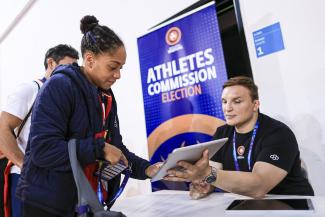Georgia Wins Quartet of Golds at U23 Euros
Tuesday, March 5, 2019 - 20:07 By Eric Olanowski

NOVI SAD, Serbia (March 6) – Georgia (115 points) went 5-0 in medal matches on the second day of wrestling at the U23 European Championships, grabbing four golds and a bronze and took the commanding 38 point lead over second-place Russia (77 points) into the third day of wrestling in Novi Sad, Serbia.
Georgia’s quartet of champions were Nugzari TSURTSUMIA (GEO), Levani KAVJARADZE (GEO), Gurami KHETSURIANI (GEO), and Zviadi PATARIDZE (GEO).
At 55kg, Nugzari Tsurtsumia shutout Romania’s Florin TITA, 9-0, and won his second straight U23 European title.
The returning U23 world champion earned two early step-outs and a takedown before the first period ended and took the 4-0 lead into the closing frame. A second takedown, followed by a right side gut wrench gave Tsurtsumia the 8-0 advantage and his second consecutive 55kg U23 European title.
In the 63kg finals, Levani Kavjaradze gassed Armenia’s Slavik GALSTYAN (ARM) and scored the 10-8 come-from-behind win in a match that saw four different lead changes.
After a back and forth first period, Kavjaradze trailed 8-4 heading into the final three minutes of the gold-medal bout. The Georgian stayed offensive early in the second period and wore down the noticeably taller Armenian. Kavjaradze scored a takedown and a pair of step outs and controlled the 8-8 lead on criteria. With under a minute left, Kavjaradze scored the match-deciding takedown and won his first U23 European title.
In the 87kg finals, Gurami Khetsuriani used his four-point lateral drop to break the 1-1 tie with Gazi KHALILOV (RUS), giving Georgia their third gold medal of the day.
Georgia’s fourth and final gold medalist came at 130kg when six-time age-group world champion Zviadi Pataridze defeated Lenard BEREI (ROU), 5-0, and won his second consecutive U23 European title.
The lone non-Georgia champion was Russia’s 2018 junior world champion Islam OPIEV (RUS), who trailed 3-0 with under two minutes to go, in the 77kg gold-medal bout, but scored a passivity point and a correct throw to defeat Serkan AKKOYUN (TUR), 3-2.
Georgia owns the commanding 38 point lead over Russia into the third day of competition. Turkey (65 points), Romania (65 points), and Hungary (40 points) round out the top five respectively.
The third day of wrestling in Novi Sad resumes tomorrow morning at 11:30 and can be watched live on www.unitdworldwrestling.org.
Team Scores
GOLD - Georgia (115 points)
SILVER - Russia (77 points)
BRONZE - Turkey (65 points)
Fourth - Romania (48 points)
Fifth - Hungary (40 points)
55kg
GOLD - Nugzari TSURTSUMIA (GEO) df. Florin TITA (ROU), 9-0
BRONZE - Viktor VEDERNIKOV (RUS) df. Ziyad ZEYNALOV (AZE), 11-2
BRONZE - Artium DELEANU (MDA) df. Bence KOVACS (HUN), 12-4
63kg
GOLD - Levani KAVJARADZE (GEO) df. Slavik GALSTYAN (ARM), 10-8
BRONZE - Erik TORBA (HUN) df. Nikalas Petrov SULEV (BUL), 9-0
BRONZE - Abdullah TOPRAK (TUR) df. Oleksandr HRUSHYN (UKR), 6-3
77kg
GOLD - Islam OPIEV (RUS) df. Serkan AKKOYUN (TUR), 3-2
BRONZE - Beka MAMUKASHVILI (GEO) df. Nasir HASANOV (AZE), 3-0
BRONZE - Tamas LEVAI (HUN) df. Paulius GALKINAS (LTU), 5-1
87kg
GOLD - Gurami KHETSURIANI (GEO) df. Gazi KHALILOV (RUS), 5-1
BRONZE - Ivan HUKLEK (CRO) df. Toni METSOMAEKI (FIN), 6-2
BRONZE - Ali CENGIZ (TUR) df. Martynas NEMSEVICIUS (LTU), 10-0
130kg
GOLD - Zviadi PATARIDZE (GEO) vs. Lenard Istvan BEREI (ROU), 5-0
BRONZE - Osman YILDIRIM (TUR) df. Artur VITITIN (EST), via fall
BRONZE - Oleg Kahaberovitch AGAKHANOV (RUS) df. Boban ZIVANOVIC (SRB), 6-4


Share your thoughts.
Comments